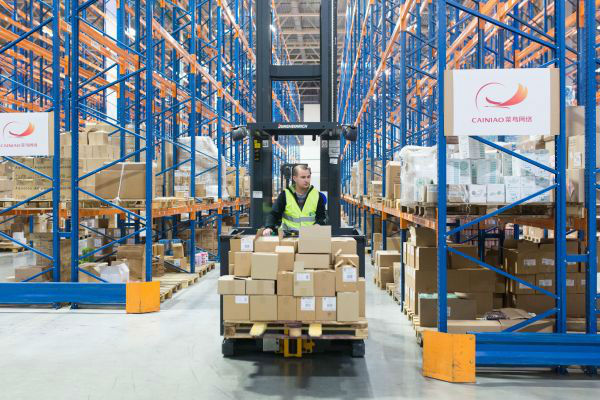


A worker transports goods in a warehouse of a Chinese e-commerce company in Moscow, Russia. (Photo/Xinhua)
China's e-commerce transactions reached 29.2 trillion RMB in 2017 ($4.26 trillion), growing 11.7 percent year-on-year.
As e-commerce offers more convenience for Chinese consumers, Chinese e-commerce enterprises are also gaining rich experience and expanding their businesses overseas.
Statistics show that in 2017, China’s cross-border e-commerce turnover rose 80.6 percent from the previous year to 90.2 billion RMB.
“Double Eleven,” the world's biggest online shopping festival held by Chinese e-commerce giant Alibaba, is the epitome of Chinese e-commerce going global.
Li Yang is a Chinese student studying in Australia. She told People’s Daily that the prices of some daily consumption goods were much higher than those in China when she arrived there three years ago. However, many of her Chinese friends, and even some local Australians have started using Taobao, an e-commerce platform of Alibaba.
In Russia, China’s e-commerce enterprises account for about half of the market share, and three of the top four e-commerce platforms in Southeast Asia are funded by Chinese capital.
China’s favorable policies are one of the reasons for the rapid overseas expansion of Chinese e-commerce enterprises. In as early as 2015, China’s Ministry of Commerce urged related local departments to support the foreign business of e-commerce companies based on their industrial characteristics and resource advantages.
So far, China has established an e-commerce cooperation mechanism with seven countries. Moreover, the country is actively participating in e-commerce negotiations under multilateral trading systems and regional trading frameworks such as the Asia-Pacific Economic Cooperation and the Shanghai Cooperation Organization.
Chinese e-commerce platform JD.com officially launched a global sales project last year, declaring that overseas consumers could enjoy fast delivery services on the platform. It set up four warehouses in Jakarta, Surabaya, Medan, and Pontianak, as well as a logistics company in Indonesia in which the company places high importance. By the end of last year, JD.com had also established a professional logistics team to deliver large commodities, significantly improving user experience.
In 2013, China’s Suning Group established a research center in Silicon Valley to develop technologies related to smart sales, such as artificial intelligence and big data. Its research results have been successfully applied to self-service supermarkets and customer service robots.
According to the McKinsey Global Institute, the annual consumption of Africa is expected to surpass $1.4 trillion by 2020, and the internet will have a 50 percent penetration rate by 2025. As a result, online sales in Africa are likely to hit $75 billion.
Alibaba has started a program in Africa to help local internet entrepreneurs, hoping to offer training courses on digital economy to 200 African entrepreneurs in the next five years.
“Global retail has entered a new round of technical upgrading, and global consumers have a growing demand for a more convenient and fashionable way to shop,” said Daniel Zhang, CEO of Alibaba.
In this regard, Chinese e-commerce enterprises enjoy broad prospects in overseas business, he added.
 Fire brigade in Shanghai holds group wedding
Fire brigade in Shanghai holds group wedding Tourists enjoy ice sculptures in Datan Town, north China
Tourists enjoy ice sculptures in Datan Town, north China Sunset scenery of Dayan Pagoda in Xi'an
Sunset scenery of Dayan Pagoda in Xi'an Tourists have fun at scenic spot in Nanlong Town, NW China
Tourists have fun at scenic spot in Nanlong Town, NW China Harbin attracts tourists by making best use of ice in winter
Harbin attracts tourists by making best use of ice in winter In pics: FIS Alpine Ski Women's World Cup Slalom
In pics: FIS Alpine Ski Women's World Cup Slalom Black-necked cranes rest at reservoir in Lhunzhub County, Lhasa
Black-necked cranes rest at reservoir in Lhunzhub County, Lhasa China's FAST telescope will be available to foreign scientists in April
China's FAST telescope will be available to foreign scientists in April "She power" plays indispensable role in poverty alleviation
"She power" plays indispensable role in poverty alleviation Top 10 world news events of People's Daily in 2020
Top 10 world news events of People's Daily in 2020 Top 10 China news events of People's Daily in 2020
Top 10 China news events of People's Daily in 2020 Top 10 media buzzwords of 2020
Top 10 media buzzwords of 2020 Year-ender:10 major tourism stories of 2020
Year-ender:10 major tourism stories of 2020 No interference in Venezuelan issues
No interference in Venezuelan issues
 Biz prepares for trade spat
Biz prepares for trade spat
 Broadcasting Continent
Broadcasting Continent Australia wins Chinese CEOs as US loses
Australia wins Chinese CEOs as US loses